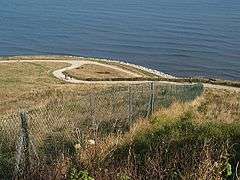Holbeck Hall Hotel
| Holbeck Hall Hotel | |
|---|---|
 The site of the Holbeck Hall Hotel | |
| Former names | Roosevelt Hotel |
| General information | |
| Type |
|
| Location | Scarborough, North Yorkshire, England |
| Coordinates | 54°16′00″N 0°23′27″W / 54.26667°N 0.39083°WCoordinates: 54°16′00″N 0°23′27″W / 54.26667°N 0.39083°W (grid reference TA0486) |
| Inaugurated | 1879 |
| Destroyed | 5 June 1993 |
| Client | George Alderson Smith |
| Owner | English Rose Hotels |
| Technical details | |
| Floor count | 3 |
The Holbeck Hall Hotel was a clifftop hotel in Scarborough, North Yorkshire, England, owned by English Rose Hotels. The hotel had scenic views of the sea and surrounding area. It was built in 1879 by George Alderson Smith as a private residence, and was later converted to a hotel.[1] On 3 June 1993, a rotational slip occurred beneath the hotel. The severity level increased, and finally on 5 June 1993, after a day of heavy rain, parts of the building dramatically fell into the sea, making news around the world. The remainder of the building had to be demolished by contractors due to safety reasons.
Although it was on a clifftop, an information board at the top of the cliff states that the incident was nothing to do with the sea, blaming it on soil creep. This is a common problem in Scarborough, with several paths and pavements clearly starting to slip down the hill. Before the cliff collapsed, there had been some very heavy rainfall, resulting in the muddy cliff turning into sludge. This flowed downhill – quite rapidly for a muddy bank – and ultimately took the hotel with it. In total 27,000m² of mud fell into the sea, and protruded 100 metres further into the sea than the original coastline.
In 1997, it became the subject of a significant court case in English civil law (Holbeck Hall Hotel Ltd v Scarborough BC[2]) when the owners of the hotel attempted to sue Scarborough Borough Council for damages, alleging that as owners of the shoreline they had not taken any practical measures at all to prevent the landslip – from soft, to hard engineering, nothing was done. The claim was rejected on the grounds that the Council was not liable for the causes of the slip itself due to the fact it was not reasonably foreseeable. Reasonable foreseeability is a requirement for liability in English and Welsh tort law.[3] The case is important for students of geography, geotechnical engineering, engineering geology, and law.
References
- ↑ "Scarborough: postcards from the edge: Once golden sands and donkey rides were the big attraction. Now visitors come to watch the town's only four-star hotel fall into the sea. Sandra Barwick reports - Life & Style - The Independent". The Independent. London: INM. 12 June 1993. ISSN 0951-9467. OCLC 185201487. Retrieved 28 May 2011.
- ↑ [2000] QB 836 (CA).
- ↑ "Holbeck Hall Hotel Ltd and another v Scarborough Borough Council". web.uct.ac.za. Retrieved 5 October 2008.
External links
- Image of hotel shortly after the collapse
- English Rose Hotels
- British Geological Survey case study of the Holbeck Hall landslip